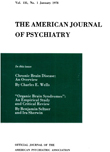THE SEMANTICS OF "ORGAN LANGUAGE"
Abstract
A comparative linguistic study of English, French, and German was made. The purpose was to investigate the mode in which the nouns for organs and the verbs for organ functions are employed in grammatical units with emotional connotation. It was found that these grammatical units can be grouped in the following way:
(1) Expressions implying a conscious awareness of the autonomic concomitants of emotional reactions.
(2) Expressions in which the noun for an organ is employed as a substitute for an emotional attitude.
(3)Idiomatic patterns with implications which have been proved accurate only with recent psychoanalytical methods of investigation.
(4)Expressions which indicate a longstanding awareness of psychosomatic relationships, the reality of which has recently been proved.
(5) Expressions whose scientific connotations are still uncertain.
Different body areas are semantically employed along definite trends. Grammatical units referring to oral and nasal mechanisms are related to the antithesis of love-hatred, numerically much more to hatred. Some words expressing hostility have an etymology associated with oral organs and oral functions. We were unable to find etymological roots which would demonstrate a connection between anal functions and expressions of hostility. Expressions in which anal functions are implied are used intentionally and consciously in "vulgar" slang words to express hostility.
There is a striking parallel between the three languages. The meaning of these findings from the point of view of social and genetic psychology is discussed.
Access content
To read the fulltext, please use one of the options below to sign in or purchase access.- Personal login
- Institutional Login
- Sign in via OpenAthens
- Register for access
-
Please login/register if you wish to pair your device and check access availability.
Not a subscriber?
PsychiatryOnline subscription options offer access to the DSM-5 library, books, journals, CME, and patient resources. This all-in-one virtual library provides psychiatrists and mental health professionals with key resources for diagnosis, treatment, research, and professional development.
Need more help? PsychiatryOnline Customer Service may be reached by emailing [email protected] or by calling 800-368-5777 (in the U.S.) or 703-907-7322 (outside the U.S.).



